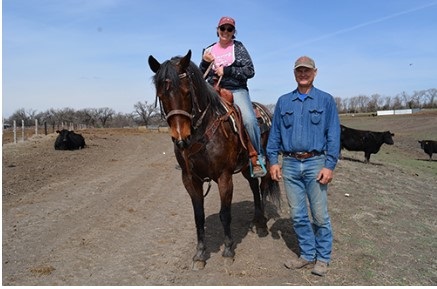PIERRE, SD – The South Dakota House, on a 37 to 30 vote, defeated HB 1219 known as the Interstate Cooperative Meatpacking Compact. South Dakota Cattlemen’s Association Executive Director Jodie Anderson whose group opposed the bill, says while on the surface the measure looked good would have created more problems than it would have solved.
 “The idea behind the Interstate Meat Compact, which would have allowed state-inspected meat to be shipped across state lines to other compacting states, is a good idea. We as an organization support interstate shipment of state-inspected meat. But unfortunately our concern with HB 1219 is that it still would have put us out of compliance with the federal Meat Inspection Act.”
“The idea behind the Interstate Meat Compact, which would have allowed state-inspected meat to be shipped across state lines to other compacting states, is a good idea. We as an organization support interstate shipment of state-inspected meat. But unfortunately our concern with HB 1219 is that it still would have put us out of compliance with the federal Meat Inspection Act.”
She says what’s needed is a federal measure that allows state inspected meat to be shipped across state lines.
“Currently, you cannot ship meat across state lines without a federal mark of inspection. It was just going to put us at odds with federal law,” explained Anderson. “ And while we agree with the idea of being able to ship state-inspected meat – interstate – this was not the solution we needed. We really need a national solution to this issue.”
Anderson says if the bill had been approved, t could have led to the loss of federal support as well as elimination of South Dakota’s state meat inspection program.
“We were also concerned this bill would put our entire state meat inspection program at risk. We have to operate under at least ‘equal to” certification and identification with the Federal Food Inspection Service (FFIS). This bill, if passed, would have caused FFIS to probably not allow our state program to be at least ‘equal to’ which means we ultimately may have lost that federal certification.”
Anderson says since state lawmakers have passed the crossover date for legislation, the chances of HB 1219 resurfacing isn’t likely.
In other states, the Montana Stockgrowers Association (MSGA) testified in opposition of HB 336: Interstate cooperative meatpacking compact, expressing concerns about the legality of the bill. It was in response to a letter from the Food Safety and Inspection Service (FSIS) to Montana’s Department of Livestock regarding HB 336. In the letter, FSIS stated that “enactment of this legislation would violate Federal law and jeopardize the “at least equal to” status of the Montana meat and poultry inspection (MPI) program.”
There are 27 states with inspection programs, certified by the Food Safety Inspection Service (FSIS), which meet or exceed federal inspection standards. However, products processed at these FSIS-approved and inspected state facilities are currently barred from being sold across state lines.
Currently there are a number of pieces of legislation addressing the issue that are being introduced in Congress. One led by Sens. Mike Rounds (R-S.D.) and Angus King (I-Maine) would amend the Federal Meat Inspection Act and the Poultry Products Inspection Act to allow the interstate sale of State-inspected meat and poultry, and for other purposes.












